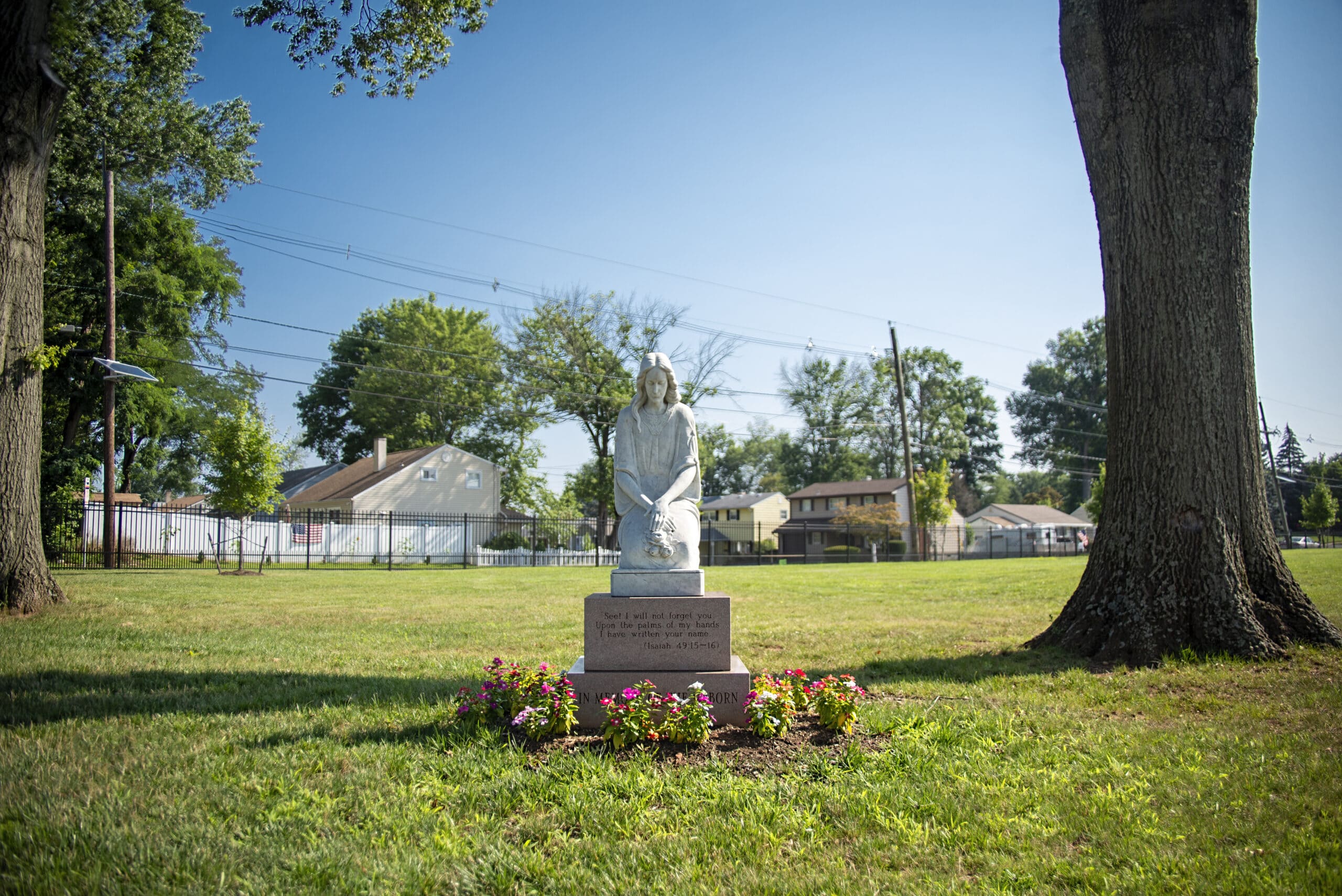Aborted children will be remembered, mourned Sept. 9
A coast-to-coast observance this month commemorates the souls of children lost to abortion.
The National Day of Remembrance for Aborted Children takes place Sept. 9, with services and gatherings at some 225 locations across the country. About 56 of those locations are gravesites for the remains of aborted children, while the majority are memorials.
Locally, memorial sites where victims of abortion are honored include Gate of Heaven Cemetery in East Hanover, St. Gertrude Cemetery and Mausoleum in Colonia, St. Christopher Catholic Church in Parsippany, Church of the Little Flower in Berkeley Heights, and St. Philip the Apostle R.C. Church in Clifton.
Now in its 15th year, the event — annually held on the second Saturday of September — is jointly sponsored by two Midwestern-based organizations, Citizens for a Pro-life Society in Michigan and the Pro-Life Action League in Illinois.
Tracing its origins to the 1988 burial of some 1,200 aborted babies at Holy Cross Cemetery in Milwaukee, the occasion — which was initiated in 2013 — has become “an important opportunity for healing from abortion,” Eric Scheidler, executive director of the Pro-Life Action League, told OSV News.
Participants have “really appreciated” the chance to “put the focus on the children’s lives and express sorrow at their passing,” he said.
SUBSCRIBE TO JERSEY CATHOLIC NEWSLETTER
For women who have had abortions, the chance to express their “regret and mourning” is cathartic, Scheidler said.
He noted the events take place in “locations already set up for difficult emotional experiences: churches and cemeteries,” where “we expect people to shed tears.”
“Whether you were pushed into that choice, or you made it yourself, the reality is that abortion is an incredible tragedy,” said Scheidler. “To hide from that, to deny the impact it had on your life and the shame that goes along with that, isn’t doing anyone any good.”
A willingness to face such pain offers a chance to “reconcile with our pasts … and to ask for God’s healing, to come and infuse our memories and experiences, and transform us.”
He and his fellow organizers have “heard stories of transformation,” he added.
“A grandmother came up to me in tears after one of our services, and she was very upset but incredibly grateful,” Scheidler said. “She couldn’t stop thanking me for allowing her the opportunity to come out and publicly mourn for her grandchild. She’d found out earlier in the week, through an insurance bill, that her first grandchild had been aborted by her daughter, who was on her health plan.”
The various gatherings have taken on renewed significance even after the U.S. Supreme Court’s overturning of the 1973 Roe v. Wade decision that legalized abortion, he said.
“In some states, a whole lot of pro-life activities, such as sidewalk counseling, have come to a halt,” Scheidler said.
Ensuring the “visibility of and education on” the issue of abortion is critical, Lois Dark, coordinator of the Respect Life ministry at St. Simon Stock Parish in Berlin, New Jersey, told OSV News.
With the blessing of its pastor, Father Michael A. J. de Leon, the parish installed a memorial to aborted children at the front entrance of the church.
“Everything we do is in prayer and education,” said Dark, who along with her fellow parishioners will mark the observance with a rosary in front of the memorial. “So many people just don’t know the truth.
“The mourning process never ends,” said Scheidler. “Until the end of the world, we will have to remember all of our dead, including those who were killed through abortion. I think this event points to the future, and we’re modeling the mourning and reparation that will have to be done by the whole of society, if we ever achieve that goal of protecting children from abortion through the whole land.”
A Rachel statue is located near the entrance of St. Gertrude Cemetery and Mausoleum in Colonia.
An image of Rachel was chosen because of her Biblical story. Rachel was Jacob’s second wife, and Joseph and Benjamin’s mother. He had worked seven years to obtain her hand in marriage. But, at the wedding, Laban, Rachel’s father, placed Leah, her older sister, in her place. So Jacob had to work seven more years to gain Rachel as his wife. Jacob loved Rachel. When she died in childbirth, she was buried just north of Bethlehem.
She was regarded as the mother of the northern tribes of Israel. When, in 721, the Assyrians conquered and deported the Israelites, Jeremiah depicted Rachel in these words-
“In Ramah is heard the sound of moaning – of bitter weeping, Rachel mourns her children, she refuses to be consoled because her children are no more.”
We use Rachel as a symbol of the Catholic church and even God, weeping for millions of children and those hurt by abortion and miscarriage.
For more information on Post Abortion Healing, contact The Respect Life Office at 973-497-4350 or via e-mail: Cheryl.riley@rcan.org.
This article was written by Gina Christian, a national reporter for OSV News, with contributions by Jaimie Julia Winters.
Featured image: Rachel statue is located near the entrance of St. Gertrude Cemetery and Mausoleum in Colonia. (Archdiocese of Newark Cemeteries)



